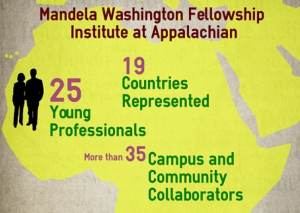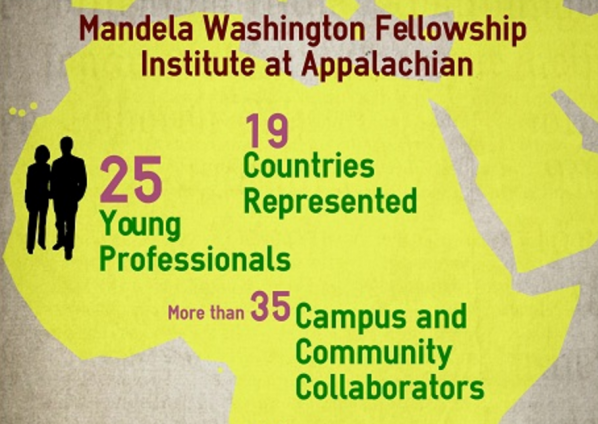Professors from the Walker College of Business Department of Management will present to the Mandela Washington Fellows on the campus of Appalachian State University during the six-week Mandela Washington Fellowship (MWF) Institute.
Jesse Pipes, director of the Holland Fellows Program in the Walker College of Business and entrepreneurship lecturer in the Department of Management, will present on Social Entrepreneurship and Seeing Opportunity: the Unity between Needs and Solutions.
The participants are members of the Mandela Washington Fellowship for Young African Leaders, comprised of 25 individuals who were competitively selected from an applicant pool of more than 40,000. Each fellow has an established record of accomplishment in promoting innovation and positive change in their organizations, institutions, communities and countries. The fellowship, begun in 2014, is the flagship program of President Obama's Young African Leaders Initiative (YALI) that empowers young people through academic coursework, leadership training, and networking. In 2016, the program will provide 1,000 outstanding young leaders from Sub-Saharan Africa with the opportunity to hone their skills at a U.S. higher education institution with support for professional development after they return home.
Co-founder of Access Health Africa, previously known as World Camp, Pipes has more than 15 years' experience assisting with the development of community based educational curricula and directing international service internship programs in Malawi. During the workshop, Pipes will share how social entrepreneurship is about applying practical, innovative and sustainable approaches to benefit society in general, with an emphasis on those who are marginalized and poor. The concept of social entrepreneurship captures a unique approach to economic and social problems, an approach that cuts across sectors and disciplines grounded in certain values and processes that are common to each social entrepreneur, independent of whether his/her area of focus is education, health, welfare reform, human rights, children's rights, workers' rights, environment, economic development, agriculture or whether the organizations they set up are non-profit or for profit entities.
"Developing a workshop for the Mandela Washington Institute supports my own vision of creating Malawi's first center for collaborative learning and impact making," said Pipes. "The spirit of the Mandela Washington Fellowship mirrors this vision. With Access Health Africa we want to contribute to the growth of a new type of philanthropy by developing a community solutions hub that responds to specific needs on the ground in Malawi by placing a special emphasis on the spirit and ambition of Malawi’s youthful population who are creative and adventurous.”

Pipes explained why Malawi's first technology and collaboration center could facilitate access to vital information and resources, and strengthen engagement between local communities, global citizens and government.
"It will include and elevate local change makers, and underpins modern education for advancements in quality of life," said Pipes. "The Access Health Africa Collaboration Hub in Malawi will build upon human capital, focus on strengthening existing interventions, and allow the global community to participate in a community solutions program connecting the best and brightest in an effort to empower youth, cultivate leaders, strengthen healthcare institutions, and extend access to quality health services, education and information."
"With more than 15 years of experience designing public health impact curriculums, Access Health Africa is uniquely positioned to become a mission-driven organization at the intersection of health, education, and social sectors," added Pipes.
Walker College Professor of Hospitality and Tourism Management Carol Kline will also present a workshop to the institute. Kline will lecture on organizational development and strategic planning for non-profit organizations.
About Appalachian's MWF Institute
Appalachian's Office of International Education and Development are responsible for implementing the program in collaboration with the university's Academic Civic-Engagement Program. Dr. Jesse Lutabingwa, associate vice chancellor for international education and development directs the program, and Dr. Brian MacHarg, director of academic civic-engagement at Appalachian serves as co-director. While at Appalachian, program fellows will participate in seminars and workshops conducted by with faculty and staff as well as leaders from local nonprofits. They will be mentored by several young leaders in the Boone/Watauga area to learn from each other. They will also volunteer with local organizations to experience volunteerism first hand. Appalachian was selected to participate in the program following a rigorous national competition. The University is one of 40 public and private institutions countrywide that have been selected to host the 2016 Mandela Washington Fellowship Institute and the only one in North Carolina. For more information, visit Appalachian's MWF site, or contact Lutabingwa in the Office of International Education and Development at 828-262-2046 or lutabingwajl@appstate.edu.
About the Mandela Washington Fellowship program
Each Mandela Washington Fellow takes part in a six-week academic and leadership Institute at a U.S. university or college in one of three tracks: Business and Entrepreneurship, Civic Leadership, or Public Management. This year, there will be a pilot Institute on Energy. Following the academic component of the fellowship, the fellows visit Washington, D.C., for a Presidential Summit featuring a town hall with President Obama. During the three-day event, fellows will take part in networking and panel discussions with U.S. leaders from the public, private and non-profit sectors. For more information, visit the Young African Leaders Initiative site.

